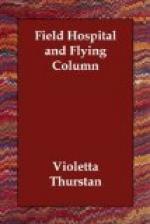Our hospital was on the main Beaumont road, and in the midst of our work we would sometimes glance out and watch the enormous reinforcements of troops constantly being sent up. Once we saw a curious sight. Two large motor-omnibuses with “Leipziger lokal-anzeiger” painted on their side went past, each taking about twenty-five German Beguine nuns to the battlefield, the contrast between this very modern means of transport and the archaic appearance of the nuns in their mediaeval dress was very striking.
Suddenly one Sunday morning the cannonading ceased—there was dead silence—Maubeuge was taken, and the German army passed on into France. It is difficult to explain the desolating effect when the cannon suddenly ceases. At first one fears and hates it, then one gets accustomed to it and one feels at least something is being done—there is still a chance. When it ceases altogether there is a sense of utter desertion, as if all hope had been given up.
* * * * *
On the morning of September 1 the German commandant suddenly appeared in the wards at 7 o’clock, and said that all the German wounded were going to be sent off to Germany at once, and that wagons would be coming in an hour’s time to take them to the station. We had several men who were not fit to travel, amongst them a soldier who had had his leg amputated only twelve hours before. I ought to have learnt by that time the futility of argument with a German official, but I pleaded very hard that a few of the men might be left till they were a little better able to stand the journey, for there is no nationality among wounded, and we could not bear even German patients to undergo unnecessary suffering. But my remonstrances were quite in vain, and one could not help wondering what would become of our wounded if the Germans treated their own so harshly. I heard from other ambulances that it was their experience as well as mine that the lightly wounded were very well looked after, but the severely wounded were often very inconsiderately treated. They were no longer any use as fighting machines and only fit for the scrap-heap. It is all part of the German system. They are out for one purpose only, that is to win—and they go forward with this one end in view—everything else, including the care of the wounded, is a side-issue and must be disregarded and sacrificed if necessary.
We prepared the men as well as we could for the long ride in the wagons that must precede the still longer train journey. Once on the ambulance-train, however, they would be well looked after; it was the jolting on the country road I feared for many of them. None of us were permitted to accompany them to Charleroi station, but the driver of one of the wagons told me afterwards that the man with the amputated leg had been taken out dead at the station, as he had had a severe haemorrhage on the way, which none of his comrades knew how to treat. He also told us that all the big hospitals at Charleroi were evacuating their German wounded, and that he had seen two other men taken out of carts quite dead. We took this to mean very good news for us, thinking that the Germans must have had a severe reverse to be taking away their wounded in such a hurry. So we waited and hoped, but as usual nothing happened and there was no news.




